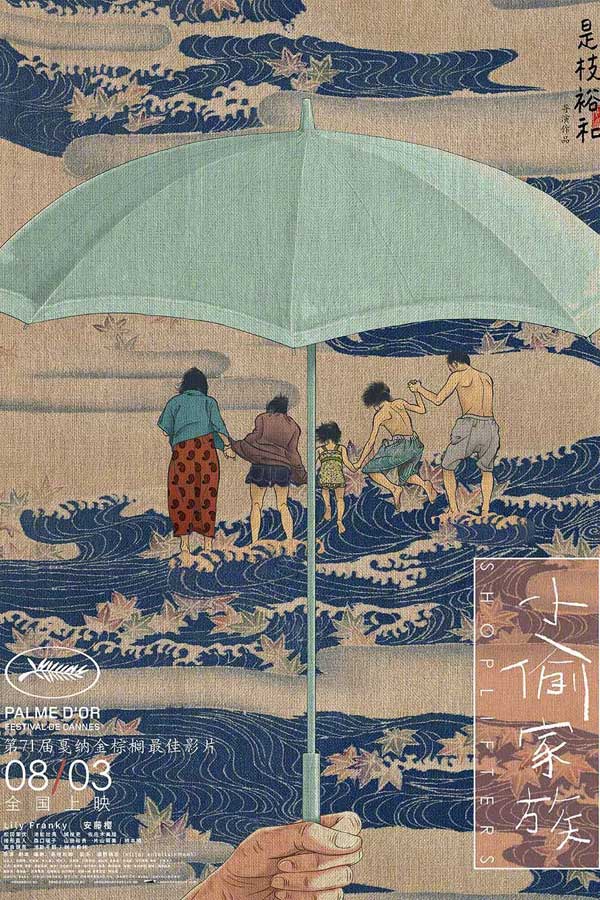BEIJING — With China and Japan signing a treaty on film coproduction earlier this year, the two countries-now the world’s second-and third-largest movie markets, respectively-have seen a rise in cinematic exchanges.
From January to August, eight Japanese films-including the Palme d’Or-winning Shoplifters, set to open on Aug 3-have been imported to the Chinese mainland, equalling the total of 2016 and 2017 during the same periods, according to the China Film Distribution and Screening Association.
A bittersweet story about a family of petty crooks, Shoplifters won Japanese auteur Hirokazu Kore-eda the top honor at this year’s 71st Cannes Film Festival, making it one of the most-anticipated arthouse films for Chinese fans.
The movie also marks the second Kore-eda work to be released in China this year, following his court-themed drama, The Third Murder, which has been screened by China’s Nationwide Alliance of Arthouse Cinemas since March 30. Founded in 2016, the alliance consisting of more than 400 theaters specializes in screening art films.
A source close to Road Pictures, the Beijing-based distributor of Shoplifters, tells China Daily that the company acquired the movie’s screening rights for at least 50 percent more than the price they offered before Cannes unveiled it was the big winner.
The source also says the company will be interested in buying more Japanese films if the stories are high quality.
Usually, Chinese distributors import theatrically released foreign films in one of two ways.
One is a box-office revenue-sharing system, which is limited by an annual quota of 34 films and gives the foreign producers 25 percent of its total earnings in China. Such films are mostly Hollywood blockbusters that are released simultaneously or around the same time in both China and North America, and often the stars fly in to promote their movie in China.
The second way is through one-off purchases without sharing profits. These are mainly imports of comparatively low-budget, independent films that have run outside China for several months-or possibly even years. Directors and actors usually won’t come to China to promote them as their contracts for the films’ marketing have expired.
Although Shoplifters has been brought to the mainland through the latter channel, the movie’s leading actor, Masaya Nakagawa-who’s better known by his stage name, Lily Franky-appeared alongside 6-year-old actress Miyu Sasaki at the Beijing premiere on July 31, signifying an effort to raise recognition of the film during the competitive summer season.
During the event, Franky says Japan’s film industry is less than 10 percent of China’s, and he hopes Shoplifters will share a minor slice of China’s huge market.
Aside from importing acclaimed Japanese movies, industry insiders are also seeing more cooperation between the two countries.
Following Shota Sometani, Hiroshi Abe and Masaharu Fukuyama, pop idol Yamashita Tomohisa has become the latest Japanese star to join the cast of a Chinese film. Co-starring singer-actor Han Geng, Chinese-British actor Rhydian Vaughan and actress Li Yuan, the crime thriller Reborn will hit domestic theatres on Aug 4.
The story is about a trio facing off against an international criminal gang, headed by the film’s villain, played by Tomohisa.
The Japan-China Cultural Industry Exchange Association, the first of its kind to create a bridge between filmmakers from the two nations, was launched in Tokyo on March 16.
Zhang Jin, founder of the Beijing-based film company, Joy Pictures, and head of the association’s Chinese arm, says the association has so far signed up more than 10 members, including Alibaba Pictures, Wanda Pictures and China Film Archive.
Zhang says he began to seek co-operation with Japanese counterparts in 2016 but found the neighbouring country’s film industry was a little conservative toward foreign newcomers.
The association established an office in Tokyo and rented a cinema in the Japanese metropolis to exclusively screen Chinese-language movies, hoping to raise Japanese filmmakers’ interest in Chinese movies.
“Over the past few years, Chinese filmmakers have produced some remakes of Japanese hits or have made movies adapted from popular Japanese novels, such as Chen Kaige’s Legend of the Demon Cat,” says Zhang, noting that few Japanese films seek to adapt Chinese stories.
Flavours of Youth, a Sino-Japanese coproduction, is an animated anthology of three short stories and is the association’s first film to change the current dynamic.
Respectively set in three Chinese cities, director Li Haoling’s fable recounts an enduring romance in Shanghai, while Yi Xiaoxing’s segment revolves around a Beijing immigrant’s yearning for his grandmother in his remote hometown. The third tale, told by Japanese animator Yoshitaka Takeuchi-one of the major creators behind the Japanese hit animated feature, Your Name-is about two sisters in Guangzhou.
Flavours of Youth will open simultaneously in China and Japan on Aug 4.
Adachi Masashi, deputy director of the association, says Your Name once boosted tourism as a lot of fans travelled to the picturesque settings featured in the film. He hopes Flavors of Youth will also raise Japanese audiences’ interest in touring the Chinese cities depicted in the movie.
He also says the Japanese film industry, which earned less than 230 billion Japanese yen ($2.06 billion) in 2017, has been lackluster for a long time.
He says he hopes China’s booming film industry will team up more filmmakers from the two countries, creating opportunities for top Japanese talent to have access to bigger budgets and a larger market to produce more international works.
